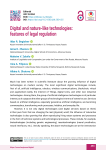Journal of Digital Technologies and Law @lawjournal-digital
Статьи журнала - Journal of Digital Technologies and Law
Все статьи: 248
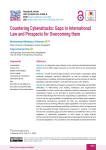
Countering Cyberattacks: Gaps in International Law and Prospects for Overcoming them
Статья
Objective: to categorize cyber attacks in the national and international legal sytems and to define legal measures to counter them at the international level. Methods: include doctrinal legal analysis, formal legal, comparative legal methods, synthesis, induction, deduction, as well as methods of legal forecasting and modeling. International legal documents and acts of national legislation, judicial precedents, and doctrinal sources were studied. Results: the article defines the legal consequences of cyberattacks, identifies difficulties in determining and holding individuals and organizations accountable for their commission, identifies national measures to counter cyberattacks based on the principle of proportionality, and systematizes the international legal framework for responding to cyberattacks. The main focus is on the urgent problems of identifying and verifying cyber weapons, establishing international standards for their use, developing methods of disarmament or limiting offensive cyber capabilities. The authors raise the issue of ensuring humanitarian activities, protecting critical infrastructure and the population through cybersecurity measures in wartime. The legal framework is analyzed; gaps and other defects are identified in the current regulation of exercising jurisdiction in such areas of cyber activity as international transactions, data localization and extraterritorial enforcement of national legislation. The parameters were developed and described within which states may conduct proactive cyber operations to prevent or deter cyberattacks (cyber countermeasures). The main parameters are due diligence, legal decisions on using cyber countermeasures, proportionality of protection measures to the consequences of illegal actions. Scientific novelty: this is due to the progressive solutions in the field of international legal regulation of cyber countermeasures by states responding to cybercrime. The solutions are formulated taking into account the impact of the countermeasures on human and civil rights and freedoms, including the right to privacy and freedom of speech. Practical significance: the research results can be used to develop and improve international legal instruments in the field of combating cyberattacks and ensuring cybersecurity, and can serve as a model for national legislators when designing law-making solutions to counter cybercrime.
Бесплатно
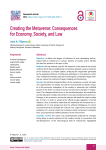
Creating the metaverse: consequences for economy, society, and law
Статья научная
Objective: to define the degree of influence of such developing technological field as metaverse on various spheres of society and to identify the need for reaction on the part of law. Methods: the key method used for the research is the systemic-structural method, which allows establishing connections between various elements of the society as a complex system, analyzing the regularities generated by the spreading influence of metaverse prototypes in one sphere on other ones. Additional methods used are formal-logical, comparative-legal methods, as well as the methods of legal modeling and forecasting. Results: the practical implementation of the metaverse concept will open new opportunities for people, but will be accompanied by drastic changes in the economic subsystem of the society, in particular, the multifold growth of the share of virtual economy and structural changes in employment. The changes will also occur in the social subsystem: the social links and the education models will transform, new personal demands will occur. Changes in the economic and social spheres will entail the need to adapt law to them, in order to preserve the effective legal regulation of social relations. Also, it should be noted that the metaverse will increase the capabilities of not only people but also the artificial intelligence, for which virtual environment is actually the “natural” one. Legal norms must provide protection of a human under the increased virtual component in people’s lives, accompanied by intellectualization of the environment. Scientific novelty: the author has systematically analyzed the changes taking place in various spheres of the modern society in connection with the development of the technological field of metaverses; highlighted the key issues arising due to the said development and requiring legal solution both at the constitutional level and at the level of sector legislation; and proposed the necessary changes in legal regulation. Practical significance: the research materials can be used when preparing proposals on changes and amendments in the current legislation, as well as in pedagogical activity, in particular, for implementation of educational courses or modules related to law under digital transformation of the society.
Бесплатно
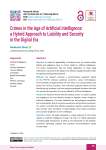
Статья
Objective: to study the applicability of existing norms on product quality liability and negligence laws to crimes related to artificial intelligence. The author hypothesizes that the hybrid application of these legal mechanisms can become the basis for an effective regulatory system under the rapid technological development. Methods: the research includes a comprehensive approach based on the PESTEL analysis (political, economic, social, technological, environmental and legal factors), the “five whys” root cause analysis, and cases from various countries. This multi-level approach allows not only identifying key problems, but also proposing adapted solutions that take into account the specifics of crimes related to artificial intelligence. Results: the research shows that the existing norms on product quality and negligence are not effective enough to regulate crimes related to artificial intelligence. The main obstacles are technological complexity, lack of precedents, lack of consumer awareness, and jurisdictional issues. The author concludes that effective regulation requires a global system that includes clear principles of responsibility, strict safety standards, and constant adaptation to new challenges. Scientific novelty: the paper represents a unique approach to the crimes related to artificial intelligence through the prism of hybrid application of existing legal mechanisms. It offers a new perspective on the problem, combining theoretical analysis with practical recommendations based on case study. Practical significance: recommendations for legislators and regulators were developed. The author emphasizes the need to create specialized agencies, introduce educational programs for citizens and employees, and to provide funding for research in the field of explicable artificial intelligence and security standards. These measures are aimed at forming a stable regulatory system capable of effectively countering crimes related to the use of artificial intelligence. The work opens up new horizons for further research on the regulation of AI technologies and emphasizes the need for international cooperation and an interdisciplinary approach.
Бесплатно
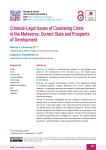
Статья
Objective: to conduct a comprehensive analysis of criminal-legal risks arising in the development of the metaverse as a new digital space of social interaction; to define the concept of the metaverse and assess the possibilities of countering criminal activity in this environment by means of criminal law. Methods: the research methodology consists of the dialectical method of scientific cognition, analysis, synthesis, and a set of specific legal methods. A systematic approach was applied to study legal phenomena in the digital environment; a comparative legal method was used to analyze foreign experience, and a formal legal method – to interpret regulations and doctrinal provisions. Results: it has been established that the metaverse attractiveness for various forms of criminal activity is largely due to the user anonymity and the lack of a clear legal regime. The study showed that numerous crimes are already being committed on the metaverse platforms. These include socially dangerous acts related to the dissemination of criminogenic and traumatic information, theft of digital property, criminal money laundering, and attacks against the sexual integrity of a person. The authors identify systemic problems of countering crime in the metaverse, including territorial jurisdiction, user identification, and procedural difficulties of proof. Scientific novelty: a comprehensive analysis of the criminal-legal aspects of the metaverse functioning was performed. The article formulated theoretical approaches to the qualification of crimes committed in the virtual space. The work substantiates the need to develop special legal structures for regulating relations in the metaverse. The authors proposed a concept of a multidimensional model of legal protection of relations in the metaverse based on public-private partnership. Practical significance: the study results can be used in improving criminal legislation in terms of regulating responsibility for crimes committed in the digital space. The work may help to develop the concept of legal regulation of the metaverse and to create mechanisms for public-private partnership in the field of countering cybercrime. The findings are relevant for law enforcement practice in the investigation of crimes committed using virtual reality technologies.
Бесплатно
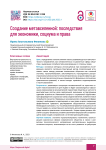
Cоздание метавселенной: последствия для экономики, социума и права
Статья
Цель: определение степени влияния такого развивающегося технологического направления, как метавселенные, на различные сферы общества и выявление потребностей в реагировании со стороны права. Методы: основным методом, используемым при проведении исследования, является системно-структурный метод, позволяющий установить связи между разными элементами общества как сложной системы, проанализировать закономерности, порождаемые распространением влияния прототипов метавселенных в одной сфере на другие. В качестве дополнительных применяются формально-логические, сравнительно-правовой, а также методы правового моделирования и прогнозирования. Результаты: реализация концепции метавселенной на практике откроет новые возможности для людей, но будет сопровождаться серьезными изменениями в экономической подсистеме общества, в частности многократным ростом доли виртуальной экономики и структурными сдвигами в занятости. Изменения коснутся и социальной подсистемы: трансформируются социальные связи, модели обучения, появятся новые потребности личности. Перемены в экономической и социальной сферах повлекут необходимость адаптировать к ним право в целях сохранения эффективности правового регулирования общественных отношений. Необходимо учитывать и то, что метавселенная увеличит возможности не только людей, но и искусственного интеллекта, для которого виртуальная среда является практически «естественной». Нормы права должны обеспечить защиту человека в условиях увеличения виртуальной составляющей в жизни людей, сопряженной с интеллектуализацией среды. Научная новизна: системно проанализированы изменения, происходящие в различных сферах современного общества в связи с развитием технологического направления метавселенных, выделены основные вопросы, возникающие из-за этого развития и требующие правовых решений как на уровне конституции, так и на уровне отраслевого законодательства, предложены необходимые изменения в правовом регулировании. Практическая значимость: материалы исследования могут быть использованы в работе по подготовке предложений о внесении изменений и дополнений в действующее законодательство, а также в педагогической деятельности, в частности, при реализации учебных курсов или модулей, связанных с правом, в условиях цифровой трансформации общества.
Бесплатно
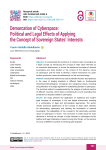
Статья
Objective: to substantiate the existence of national cyber sovereignty as a legal concept; by introducing the concept of state cyber interests as an innovative determinant, to review the traditional concepts of national sovereignty and state borders in the context of the dynamic nature of cyberspace and the need to develop a hybrid mechanism for cyber borders protection, based simultaneously on law and technology. Methods: the doctrinal method was used to identify the basic discrepancies in the views of leading scientists in different fields on fundamental theoretical-methodological, conceptual and categorical issues, including the justification of a single algorithm for establishing borders in cyberspace. The doctrinal method is supplemented by the analysis of judicial practice of different countries, which allows considering the courts extending their jurisdiction to disputes related to cyberspace. Results: the study presents the application of traditional and modern legal concepts of sovereignty in the new digital environment, resulting in a combination of legal and technological approaches. The author reveals functional significance of the concept of state cyber interests for demarcating cyberspace and defining the boundaries of national sovereignty. The adaptability of this concept to the technically uncertain nature of cyberspace is shown. The conclusion is made about the main directions in forming the concept of cyber interests in cyberspace and its political and legal implications, based, among other things, on the practice of courts of different countries in resolving cyber disputes. Scientific novelty: the concept of state cyber interests is considered as an innovative method of defining cyber borders. It leads to the transformation of the traditional sovereignty concept and the close national interest concept in relation to cyberspace in the context of fulfilling security requirements and intensifying national defense against cyber threats. Practical significance: the obtained results eliminate existing contradictions in the definition of sovereignty and its spatial limits under the modern technology development; contribute to the elaboration of a disciplinary standard of cyber sovereignty based on a reliable demarcator necessary for the definition of state sovereignty and borders in cyberspace; adapt traditional legal concepts of sovereignty and national interests to the global modern cyber challenges; contribute to the transformation of traditional legal concepts of sovereignty and national interests in cyberspace.
Бесплатно
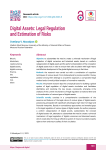
Digital Assets: Legal Regulation and Estimation of Risks
Статья научная
Objective: to substantiate the need to create a universal mechanism of legal regulation of digital currencies and tokenized assets, based on a uniform categorization of digital assets and the author’s interpretation of the conception of digital assets risk, in order to ensure their safe circulation with legal means and effective development of the global digital economy in the future. Methods: the research was carried out with a combination of cognition techniques of various levels: from philosophical to private scientific; the key position among them belongs to a systemic approach, a comparative legal method and a formal-juridical analysis of normative materials. Results: the present research lays the conceptual basis for building a global system of legal regulation of digital assets circulation and facilitates identifying and resolving the key issues, necessarily emerging in the analysis of the current mechanisms of legal regulation at national level and in the estimation of various types of digital assets. Scientific novelty: consists in a comprehensive consideration of the essence and features of the legal nature of various types of digital assets, possessing, alongside with significant advantages, high risks from legal and financial viewpoints. Based on contradictory approaches and revealed gaps in the legal regulation of various types of digital assets, the author proposes a uniform categorization of digital assets, substantiates the concept of digital assets risk, attempts to substantiate the need to create a universal mechanism of legal regulation of digital currencies and tokenized assets, which would allow forming an effective system of means to protect property right to them and ensure safety of their circulation. Practical significance: is due to the current absence of a unified approach and a possibility to apply the existing legal norms in relation to innovative digital assets, taking into account their specificity, despite their trans-border character. The main provision and conclusions of the research can be used to improve the mechanisms of legal regulation of digital assets circulation.
Бесплатно
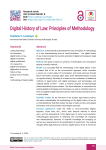
Digital History of Law: Principles of Methodology
Статья
Objective: to theoretically substantiate the basic principles of methodology of a new interdisciplinary area of socio-humanities – the digital history of law; to demonstrate the heuristic potential of digital technologies in legal historical sciences. Methods: the study is based on systemic, formal-logical, and comparative general scientific methods. Results: it is concluded that the methodology of the digital history of law is based, first of all, on the source-centric approach, which considers a source as a macro-object of humanitarian and social sciences, through which information exchange takes place (O.M. Medushevskaya’s concept of cognitive history). Secondly, it is based on the combination of traditional methods of legal history with digital techniques and technologies and methods based on them – within a research program of historical-legal (historical-juridical) source studies. The article attempts to summarize the existing digital technologies and techniques, as well as methods based on them, as applied to legal historical sciences; their heuristic potential is shown in case studies. Scientific novelty: for the first time in the Russian legal history science, the author substantiates the methodology of the digital history of law as an interdisciplinary field that studies the past of state and law using digital information and communication technologies and tools. Practical significance: under the shifts in socio-humanities (digital, linguistic, visual ones, etc.), which have become relevant in recent years, and the development of the digital type of social communication, methodological approaches to obtaining new knowledge are changing, new interdisciplinary branches of scientific knowledge are emerging, as well as new requirements for the qualification of researchers. The ongoing changes affect legal historical sciences: digital history of law is formed as an interdisciplinary area within digital humanities, at the confluence of history, legal science, and information science. The understanding and application of digital technologies and the scientific cognition methods based on them in legal historical research open up new opportunities for legal historians in determining the directions of their scientific research and obtaining new scientific results. This ultimately expands our understanding of historical and legal facts, phenomena and processes.
Бесплатно
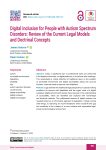
Статья научная
Objective: today, a significant part of professional tasks are performed in the digital environment, on digital platforms, in virtual and other meetings. This necessitates a critical reflection of traditional views on the problem of accessible environment and digital accessibility, taking into account the basic universal needs of persons with disabilities. Methods: a gap between the traditional legal perspective on special working conditions for persons with disabilities and the urgent need of a digital workplace (digital environment) clearly shows lacunas in the understanding of accessibility, which are identified and explored with formal-legal and doctrinal methods. The multifaceted aspects of digital inclusion are revealed based on an informative approach to legislation. It leads, among other things, to searching for recommendations which would fill this gap and contribute to the creation of a more inclusive and responsible legal, social and technological environment. Results: the research has led to a conclusion that the existing legal, social and technological paradigms need to be re-evaluated. This reevaluation should aim to develop a more inclusive and benevolent concept of accessible environment that takes into account the diversity of human experience and needs, and a wide range of behavioral and cognitive characteristics. Creating special conditions in the workplace for those with overt and covert health problems should become an integral part of the employer’s focus, along with improving management efficiency. Scientific novelty: covert (hidden) health problems have traditionally been understudied, although they include a range of mental and physical impairments, which, like explicit health problems, vary in their origin, intensity, and permanent or episodic character. This study fills a gap in the issues of disability and its legal protection, taking into account the trend of digital inclusion, the dynamic labor activity of today, and the wide range of human abilities and needs. Practical significance: the aspects of hidden or latent disability considered in the study provide a different perspective at employment, focusing on the workplace conditions that could be created. Employers may be unaware of the need to create special working conditions for those with hidden health problems. This results in negative effects on unemployment, increased sick leave, limited opportunities in the workplace, and more. Employees are often reluctant to disclose their non-obvious health problems to employers; hence, employers should facilitate disclosure of such information by creating relevant conditions. Such an approach will contribute to the legal protection of this category of employees and to further development of the existing legislative regulation, since the latter does not fully comply with today’s needs and changed reality.
Бесплатно
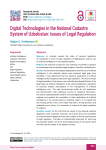
Digital Technologies in the National Cadastre System of Uzbekistan: Issues of Legal Regulation
Статья научная
Objective: to critically analyze the state of national legislation of Uzbekistan in terms of legal regulation of digitalization and the use of artificial intelligence in the cadastral sphere. Methods: the research is based on such methods of scientific cognition as formal-legal and comparative-legal analysis, induction and deduction. Results: the provisions that regulate digitalization and the use of artificial intelligence in the cadastral sphere were analyzed, legal gaps were identified. It was determined that the practical application of artificial intelligence technologies outpaces its legal regulation. The shortcomings of legal regulation in this sphere were noted (lacking legal definition of the legal status of artificial intelligence in the national legislation; regulation of business entities’ participation in the management of artificial intelligence, etc.). The said shortcomings hinder its full application and harmonization with traditional sources of cadastral information. The author substantiated the need for universal digitization of the national cadastre and predicts the possibility of wider application of artificial intelligence in the natural-resource cadastral system. It is argued that the existing system in its current state may lead to wrong decisions and cadastral errors, hence, it is necessary to improve the legal regulation of cadastre. Scientific novelty: for the first time the results of the national cadastre digitization were assessed. Forecasts were given about the possibility of using artificial intelligence in this area, subject to further improvement of legal regulation. The latter is fundamentally important for reforming the cadastral system, since the technological basis of this system does not fully meet the needs of the digital economy. Practical significance: it is due to the lack of legal regulation of the artificial intelligence concept and legal status in the national legislation, as well as a unified approach to the cadastral system digitalization. Modern technologies are actively used in practice, but lack a sufficient legal basis. The main conclusions, proposals and recommendations of the study can be a basis for further improvement of the legal framework of Uzbekistan in terms of the application of artificial intelligence technologies.
Бесплатно
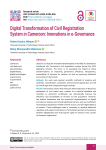
Digital Transformation of Civil Registration System in Cameroon: Innovations in e-Governance
Статья
Objective: to study the innovative transformations in the field of e-Governance introduced into Cameroon’s civil registration system during the 2024 legislative reforms. The focus is on assessing the impact of these transformations on improving governance efficiency, transparency, accessibility of services for citizens, as well as improving statistical accounting of vital events. Methods: the work uses general scientific methods of analysis and synthesis, classification, systematic and functional approaches, as well as formal legal and comparative legal methods. Results: the research shows that measures like introduction of electronic declaration of civil status acts, creation of a national database and transition to electronic certificates can dramatically improve the efficiency and accessibility of services for the population. However, the authors emphasize that the successful implementation of digital innovations requires overcoming significant barriers, such as insufficient technological equipment, limited Internet access, and low digital literacy of citizens. These challenges make it necessary to develop additional regulatory and support mechanisms. Particularly important is the balance between digitalization and ensuring the rights of citizens in the context of electronic registration. Scientific novelty: the work provides unique empirical data on digitalization of public services in Cameroon. This is especially important for the countries of the global South, where such transformations are slow and fragmentary. The study makes a significant contribution to the scientific debate by expanding understanding of digital technology adoption models through the lens of expected usefulness and perceived ease of use in developing countries. Practical significance: recommendations for legislators, government officials and other stakeholders were developed. The authors emphasize the need to adopt a regulatory framework as soon as possible, introduce educational programs for employees and citizens, and ensure access to digital technologies. These measures aim at creating a sustainable infrastructure for an effective transition to electronic systems and improving the quality of public services. The work contributes to the study of public governance digitalization, offering both theoretical concepts and practical solutions that can be adapted for other countries with similar challenges.
Бесплатно
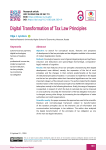
Digital Transformation of Tax Law Principles
Статья
Objective: to search for conceptual issues, features and prospects of development of tax law principles and tax obligation institute in the context of modern digitalization trends. Methods: the study is based on a set of general legal (analysis and synthesis, induction and deduction) and special-legal (formal-legal, comparative-legal) methods of cognition. Results: the main features of tax law principles characterizing their digital development were defined, namely: the expansion of the list of such principles and the changes in their content, predominantly at the level of institutional principles of taxation. A conclusion is made that in the digital era the tax law principles retain their theoretical significance as the most important category of the relevant science. The author states that the digital transformation of the institutional principle of tax fulfillment independence takes place mainly in the following directions: firstly, the range of taxpayers is expanded, in respect of which the duty to calculate tax can be imposed on a tax authority; secondly, the mechanism of the tax obligation execution is changed, among other things, by increasing the tax obligations of state authorities and credit organizations. Scientific novelty: the paper assesses the approaches used in the scientific literature and normative-legal framework related to transformation of the taxation principles due to the intensive use of information and communication technologies in tax relations. The author also analyzed the digital transformation of the principles of tax obligation as one of the main tax-legal institutions. Practical significance: is due to the lagging pace of tax legislation development in the Russian Federation compared to the objective processes of creation and application of new information and communication technologies in tax relations and adjacent spheres. The main provisions and conclusions of the study can be used as a basis to improve the tax legislation, as they develop knowledge about new tax law institutions – professional income tax, tax monitoring, single tax payment, and automated simplified taxation system.
Бесплатно
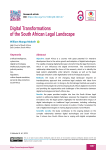
Digital Transformations of the South African Legal Landscape
Статья
Objective: South Africa is a country with great potential for intensive development due to the active growth and adoption of digital technologies. The rapidly emerging digital landscape is transforming the legal framework, which in turn influences the digital environment. This transformative relationship determined the focus of the research, which is to identify the legal system adaptability under dynamic changes, as well as the legal landscape evolution under digitalization and technological progress. Methods: the study of the changing legal landscape required an interdisciplinary approach that combines legal analysis with ideas from sociology, economics, etc. In doing so, the formal-legal method was used to examine the key legal instruments shaping South Africa’s digital environment and providing the opportunities and challenges of the interaction between digital technologies and South African law. Results: the paper provides insights into how the South African legal system is addressing digital challenges; assesses the integration of digital innovations into the legal system; highlights the transformative impact of digital technologies on traditional legal processes, including collecting evidence, dispute resolution and access to justice. Finally, it evaluates the role of digital technologies in making legal processes more efficient. Scientific novelty: the study contributes to the ongoing debate on the complex relationship between digital technologies and South African law. It shows how South African law is coping with digital complexities and substantiates new insights into the transformation of the traditional legal paradigm as a result of digitalization, as well as its implications for legal proceedings and access to justice. By delving into the adaptations, challenges and innovations arising at the intersection of law, technologies and digitalization, insights are gained into how South African law navigates the dynamic digital landscape. Practical significance: adapting the legal landscape to digitalization and technological advances is critical to ensure rapid technological progress. It also requires collaboration between government agencies, civil society, experts in law and technology. The study provides valuable recommendations and suggestions for policymakers, legal practitioners and stakeholders shaping South Africa’s legal ecosystem. The author addresses the challenges of ensuring personal data privacy, enhancing electronic interactions, and countering cybercrime. The importance of introducing technological achievements while maintaining robust legal safeguards is emphasized.
Бесплатно
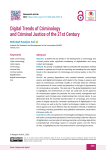
Digital Trends of Criminology and Criminal Justice of the 21st Century
Статья научная
Objective: to define the key trends in the development of criminology and criminal justice under significant broadening of digitalization and using modern technologies. Methods: the priority of analytical method combined with descriptive method provided an optimal set of tools for searching and revealing the main digital trends in the development of criminology and criminal justice in the 21st century. Results: the growing dependence was revealed between criminal-legal science and digital technologies, which leads to the change in essence and types of contemporary criminality, models of criminals’ behavior, methods and mechanism of crime control and prevention in the light of requirements of criminal policy and justice. The dual role of the global digitalization trend is highlighted, the achievements of which are used both by the agencies of criminal justice system (in particular, for crime control, management and prevention) and criminals when implementing their criminal intents. It was determined that the essential transformation of criminology and criminal justice is largely caused by a dramatic development of digitalization in the 21st century, as well as by the modern technologies created on its basis, which appear to be more effective than the standard methods of traditional criminology, including quantitative and qualitative estimations, observation, interviews, polls, etc. Scientific novelty: new spheres of criminal-legal knowledge are introduced, as well as the corresponding disciplines formed exclusively under the influence of digitalization, such as cyber criminology and cyber victimology; algorithmic (computational) criminology, based on actuarial justice and the theory of risks, is highlighted as the most recent trend in criminological science. Practical significance: the account of trends and positive experience gained in the sphere of digitalization determines the successful solution of the tasks associated with crime counteraction, transformation of approaches to the content, goals and methodology of applied criminology and criminal justice. The global megatrend of digitalization essentially changes the appearance of the criminal-legal science, sets the new theoretical and applied directions of its development. Timely upgrade and adaptation of knowledge, skills and capabilities in compliance with the achievements of digitalization will allow criminology and criminal justice to correspond to the tasks of the new millennium.
Бесплатно
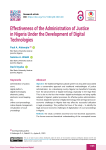
Статья
Objective: the traditional Nigerian judicial system has long been associated with a conservative approach and traditional methodologies of justice administration. As a developing country, Nigeria has benefited immensely from the advancement of digital technology, especially in the legal field. This is due to the fact that modern digital technologies are being rapidly adopted in Nigeria’s judicial processes for effective justice administration. However, despite the promise of digital technology, there are legal and socio-economic challenges in Nigeria that may affect its successful utilization in legal proceedings. This justifies the focus of the study – to identify the legal and socio-economic challenges of digitalization of court proceedings in Nigeria. Methods: the study combines doctrinal and non-doctrinal approaches. The former ensures theoretical understanding of the conceptual issues and prospects of court proceedings virtualization. It also allows exploring, based on primary and secondary sources (laws, monographs, research articles and internet resources), the legal and socio-economic challenges of the use of digital technologies in court proceedings. The non-doctrinal approach consists in polling, describing and analyzing the results of a sociological survey. The survey was conducted among Nigeria residents to reveal their attitudes towards innovations in digitalization and virtualization of court proceedings as well as the challenges posed by these processes. Results: the study revealed that the use of digital technologies in court proceedings in Nigeria has several prospects of ensuring effective justice administration and accurate recording and storage of information. Along with the benefits, challenges are shown that may reduce the effectiveness of court proceedings digitalization. Scientific novelty: consists in investigating the use of digital technology in Nigerian court proceedings and identifying the prospects of improving the efficiency of justice administration in Nigeria under digitalization, as well as the challenges arising from this trend. Practical significance: the study will enable stakeholders in the Nigerian legal sector to identify legal and socio-economic challenges that may adversely affect and render ineffective the use of digital technologies in legal proceedings. In addition, the article offers practical recommendations to address these challenges.
Бесплатно
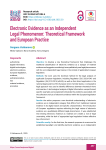
Electronic Evidence as an Independent Legal Phenomenon: Theoretical Framework and European Practice
Статья
Objective: to develop a new theoretical framework that challenges the traditional classification of electronic evidence as a subtype of material evidence and suggests considering it as a qualitatively new legal phenomenon with its own independent legal nature in the context of applicable European legislation. Methods: the work uses the doctrinal method for the legal analysis of applicable European legislation, including Regulation (EU) 2023/1543 and Regulation (EU) 910/2014 (eIDAS), as well as their direct application in the national legal systems of the European Union member states. A comparative legal approach was used to identify differences between theoretical views and case law. A technological analysis of digital information was performed; specific examples were explained to illustrate the problems associated with the collection and use of electronic evidence within the European legislation framework. Results: the author proposes a new doctrinal understanding of electronic evidence as an independent category that differs from traditional material evidence in its digital nature and specific characteristics. The introduction of European regulations requires rethinking the legal nature of electronic evidence as a qualitatively different legal phenomenon. It was established that treating electronic evidence as material one creates a risk of legal uncertainty, while the lack of appropriate legal regulation hinders effective law enforcement. Scientific novelty: for the first time, the research proposes to overcome the established paradigm and identify electronic evidence as an independent legal category in the system of evidence types. The article substantiates the unique digital nature of electronic evidence and the need to create an independent legal framework in various national legislations. It is proposed to improve scientific terminology using the term “electronic evidence”, which corresponds to the legal definitions in the legislation under study, instead of the outdated term “digital evidence”. Practical significance: the work contains specific practical recommendations for the use of electronic evidence in the procedures for its identification, storage, presentation and analysis in various court proceedings in accordance with applicable supranational legislation. The research helps to overcome outdated ideas about the legal nature of electronic evidence and their incorrect identification with material evidence. This is important for effective law enforcement in the European Union member states.
Бесплатно
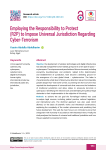
Статья
Objective: the development of wireless technologies and digital infrastructure has radically changed the human habitat, giving rise to a new type of space – a cyberspace. The uniqueness and peculiarities of this environment, including anonymity, boundlessness and problems related to the determination and establishment of jurisdiction, have become a breeding ground for the emergence of a new global threat – cyberterrorism. The latter is characterized by a high level of latency, low detection rate and incomparably greater danger than “real world” crimes. Countering new forms of crime has required the development of universal tools that overcome the limitations of traditional jurisdiction and allow states to prosecute terrorists in cyberspace. Identifying the relevant tools and identifying the political-legal obstacles to their implementation is the objective of this study. Methods: to achieve the set goal the formal-legal method was used to analyze legal sources, including judicial practice, national legislation, and international acts. The doctrinal approach was also used, which allowed, on the basis of scientific works and theoretical constructions, explaining the complexity of the modern phenomena and predicting their future development. This said, the main focus is on criminals to prove their antagonism with humanity in accordance with theoretical views. Finally, the study analyzes the theories of universal and traditional jurisdiction and how they are applied to prosecute terrorists. Results: the paper provides a critical analysis, reviewing and adapting the concept of jurisdiction as applied to a global, borderless and decentralized digital environment (cyberspace) and to the struggle against new forms of terrorism (cyberterrorism). Various jurisdictional models applicable in cyberspace are presented. The author bridges the gap between the main branches of law: international private law and public law by linking, in relation to cyberterrorism, the two theories: the “responsibility to protect” (R2P) theory and the application of universal jurisdiction. The trends of universal jurisdiction development are revealed. Scientific novelty: the study develops the accumulated scientific knowledge while justifying the introduction of foreign jurisdiction in a state territory to prosecute cyberterrorists. It also establishes a link between the theory of universal jurisdiction in private international law and the “responsibility to protect” (R2P) theory in public international law, recognizing the latter as a relevant basis for the introduction of universal jurisdiction over cyberterrorism. Such traditional concepts as sovereignty and jurisdictional independence are reviewed. The gap related to the consideration of cyberterrorism as a crime against humanity in international law is bridged. Practical significance: the implementation of the proposed conclusions will contribute to the strengthening of international prosecution of cyberterrorism and harmonize the international and national legal tools to struggle against this crime.
Бесплатно
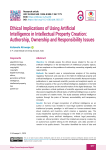
Статья
Objective: to critically assess the ethical issues related to the use of artificial intelligence in the development of intellectual property objects, with an emphasis on the problems of authorship, ownership, originality and responsibility. Methods: the research uses a comprehensive analysis of the existing regulatory framework and case law in the field of intellectual property and artificial intelligence. A systematic review of the scientific literature includes publications in peer-reviewed scientific journals and analytical reports on the ethical aspects of the use of artificial intelligence, legislation in the field of intellectual property and the transformation of the digital landscape. The author provides a critical synthesis of scientific arguments and theoretical discussions regarding the ethical status of artificial intelligence as an author and co-author of creative works. The study assesses artificial intelligence systems through the prism of fairness, accountability and transparency concepts. Results: the lack of legal recognition of artificial intelligence as an author or inventor was revealed in most legal systems worldwide; the intellectual property paradigm is still based on human-centered ideas about creativity and invention, which creates a regulatory gap. The study established significant ambiguity in the fields of ownership and accountability, since artificial intelligence, without legal personality, creates an ethical problem: should the intellectual property created by an autonomous system belong to the developer, user, data provider or remain in the public domain. The author identified the risks of bias and exploitation in creative industries where artificial intelligence is trained using copyrighted materials without permission or compensation to their creators. There has been a shift towards double ethical standards due to jurisdictional and sector differences in relation to works created using artificial intelligence. This promotes unfair global differences in the protection of intellectual property rights. Scientific novelty: the author presented a multifaceted interdisciplinary analysis that integrates the legal, ethical and technological fields of research on intellectual property created using artificial intelligence. The developed conceptual framework may help to comprehensively solve the ethical and regulatory issues arising in connection with works created with the participation of artificial intelligence, including the justification of the need for legal reform, taking into account the ethical imperatives of modern technological development. Practical significance: The study contains ethically grounded recommendations for legislators, legal practitioners, and technology developers to amend intellectual property legislation to effectively address issues of authorship, ownership, and accountability in relation to works created using artificial intelligence. The recommendations may ensure a balance between stimulating innovations and protecting the rights of a human author.
Бесплатно
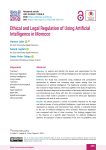
Ethical and Legal Regulation of Using Artificial Intelligence in Morocco
Статья
Objective: to explore and identify the issues and opportunities for the ethical and legal regulation of artificial intelligence by the example of digital transformation in Morocco. Methods: the study was conducted using analytical and comparative approaches to address the emerging legal issues arising from the development of artificial intelligence. The traditional scientific method in law is based on legal analysis, which was applied to the study of legal texts, scientific literature, diagnosis of the condition of the study field at the national and international level. Along with this, the comparative approach in law was used, which made it possible to examine the Moroccan legislation comparison with that of other countries. Results: the article presents a review of scientific literature on the legal and ethical issues of using artificial intelligence. Legal texts and decrees developed at national and international level, directly or indirectly linked to the use of artificial intelligence, were reviewed. Moroccan legislation was compared with that of other countries. The findings suggest that, in the absence of a specific legal framework for artificial intelligence systems, the adoption of ethical standards in the form of guidelines, best practices and ethical charters is preferable. These mechanisms appear to be a viable alternative to legal regulation. In this sense, several initiatives were taken to promote “soft law”, which aims to encourage appropriate behavior of technological agents. Scientific novelty: the analysis of digital transformations in Morocco made it possible to present a comprehensive view on the role of ethical aspects and on the sufficiency of law to respond to the changes in the modern society, transformed by the development of artificial intelligence. Practical significance: the study allows identifying ways to find a more flexible balance between “soft” and “hard” law in the regulation of relations, taking into account the technological reality. This should encourage the appropriate behavior of technological agents and positively affect the specificity of the current situation. Today, the “hard law” slowly recognizes and addresses the problems associated with the digital technologies’ regulation and slowly takes into account the possible risks posed by artificial intelligence and the insufficiency of its regulation.
Бесплатно

